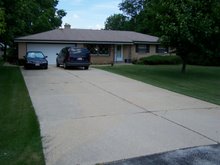
Nate, these pictures are for you! The wood siding was in decent shape, but there was a lot of rot because the builder of this masterpiece didn't use pressure-treated wood. I started with the sledge hammer and knocked the siding off of two sides. The area with missing framing was heavily rotted and took almost no effort to remove. I was going to cut the shed into pieces, but found it was easier to just dismantle it with the sledge.

Here's why you should use pressure treated wood for the sill plates. The entire corner was rotted away and filled with bugs. It didn't help that the roof leaked heavily. I was surprised with how well the shed was built, but that they went stupid and used a flat roof and a swing-in door. The more I look at it, the more I think this wasn't really a shed, but more of a garden shed for potting plants. Size-wise, this shed would have been useless for lawnmowers or other lawn-care tools.

Did I mention the roof leaked? Black isn't a good color for roof supports. This beam was rotted, as were the ends of the roof decking which were above it.

Here, most of the roof has been taken apart except for the last bit which was above the shed door. The roof was covered with 4' x 4' shingles. Well, they weren't really shingles, but were made from the same material. There were plenty of nails holding the "shingles" in place, but none of them were caulked or covered in tar. The seams (and there were a LOT of seams on this roof) were also not caulked or tarred. Gee, I wonder why it leaked? Bad choice of roof design, no slope to the roof, and poor execution. This might have worked if they had used a one-piece rubber membrane of some type or at least slopped the whole roof with tar.



